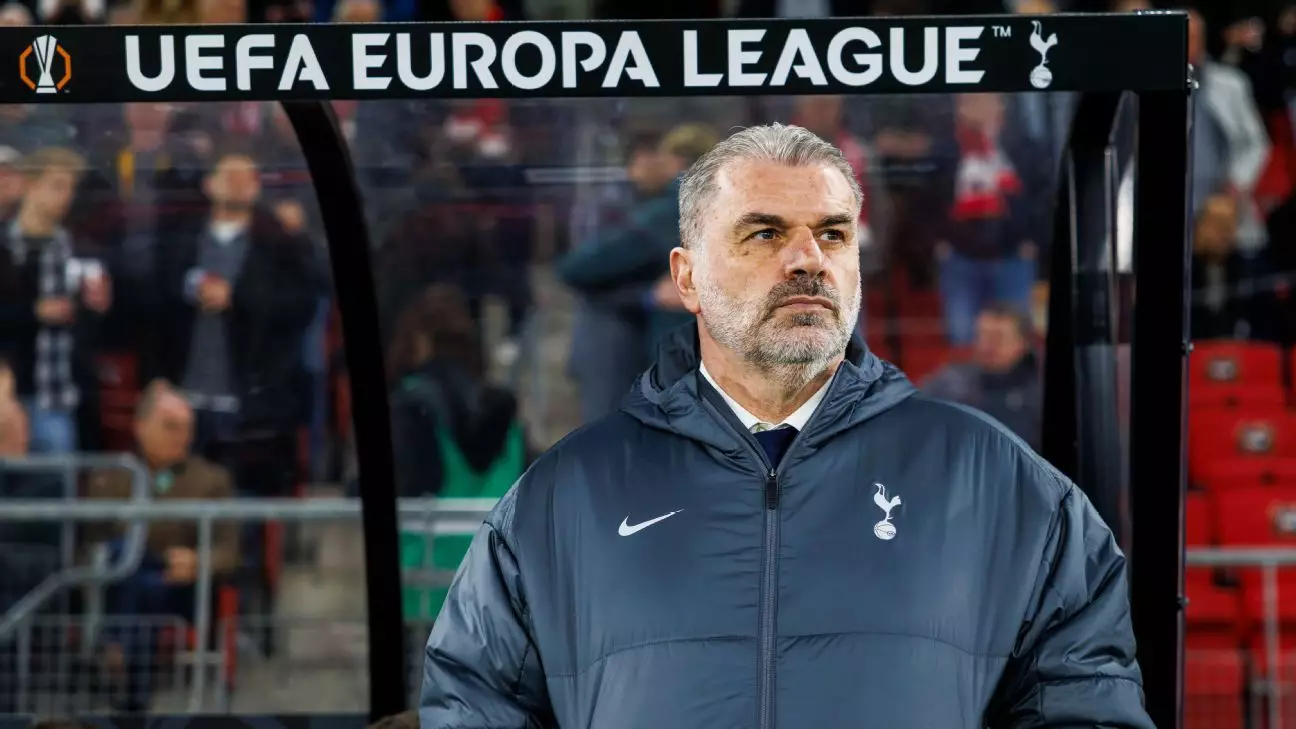Ange Postecoglou finds himself amidst a tempest at Tottenham Hotspur, where expectations intertwine with historical disappointments. As the club’s manager, he is not only tasked with restoring Tottenham to its former glory but is also charged with warding off relentless scrutiny from both fans and pundits alike. The Premier League, currently unforgiving, has seen the team languish within its bottom ranks, prompting intense debates surrounding Postecoglou’s long-term viability at the helm. Here lies an enigmatic figure, grappling with the weight of expectation while trying to inject a fresh sense of optimism into a team in dire need of revival.
Redemption Through Europe: A Pivotal Moment
Scheduled to face Eintracht Frankfurt in the first leg of the Europa League quarterfinal, this match serves as an existential crisis for Tottenham. Herein lies an opportunity for redemption, where success could turn the tide of a disappointing season. The stakes could not be greater: should Postecoglou wish to quell the tide of criticism, winning this trophy becomes paramount. The historical context deepens the narrative; Tottenham has not clinched a significant trophy since the League Cup in 2008, and thus, eyes are sharply focused on this upcoming clash.
Yet, the narrative surrounding the match extends beyond mere numbers and statistics; it delves into the emotional and psychological realm that governs soccer. The manager’s candid remarks on the toxic atmosphere often surrounding Tottenham suggest that the very psychology of the club is at play—where positivity is quickly shadowed by negativity. “Even the good stuff we do is going to be turned into a glass half-empty rhetoric,” he articulated, revealing a profound understanding of his club’s psychological landscape.
From Critique to Constructive Dialogue
Postecoglou’s frustration over media interpretation highlights a critical issue: the narrative framework imposed on managers and players alike. The emphasis on the negative, particularly when discussing an incident like Brennan Johnson’s penalty, reveals a troubling trend. The scenario was a moment of triumph, yet the post-match commentary convoluted it into an opportunity for criticism. Rather than celebrating the win, many in the media focused on the squabbles over an individual player’s desires. Here, Postecoglou advocates for a change in dialogue; he proposes a focus on collective effort rather than internal dissent.
Moreover, he has called for the fans to create a vibrant atmosphere, akin to what their North London rivals, Arsenal, experienced in their recent European endeavors. This is an essential strategy not just for the impending match but for building a fortress at home that can withstand the pressures of the league. The confluence of a passionate crowd with a dedicated team can engender a winning mentality, offsetting the toxicity that sometimes pervades discussions around the club.
Historic Context: The Ghosts of Spurs Past
The shadow of past failures looms large over Tottenham, particularly for fans and stakeholders yearning for glory. The world of professional football is often unforgiving; success is expected, and failure is magnified. The echoes of disappointment from the 2019 Champions League final still resonate; since then, Tottenham’s aspirations have faced numerous hurdles. The club’s identity has become intertwined with narratives of “almosts.”
In the midst of these turbulent waters, Postecoglou offers a starkly realistic perspective: “Even if we win [the Europa League], I am gone anyway.” This admission speaks volumes to the struggles of modern football management, where long-term vision often collides with short-term performances. While some fans might see a trophy as a panacea, the harsh reality remains that for a section of the fanbase, such triumph might still fall short of reversing deeper-seated sentiments.
Building a New Identity: A Task Ahead
In the grand tapestry of football, cultivating a new identity for Tottenham Hotspur will require more than just winning trophies—it demands a cultural renaissance within the club. Postecoglou’s focus should be on instilling resilience, fostering community, and nurturing talent. This journey won’t be solved in a single match; rather, it is a process that necessitates time, trust, and unwavering belief from all stakeholders.
Thus, as Tottenham prepares for this crucial encounter with Eintracht Frankfurt, a critical axis of hope spins around the core belief in transformation. Ultimately, whether Postecoglou remains a figure of contention or a catalyst for change will depend on the club’s ability to embrace a narrative of resilience rather than one of resignation.

